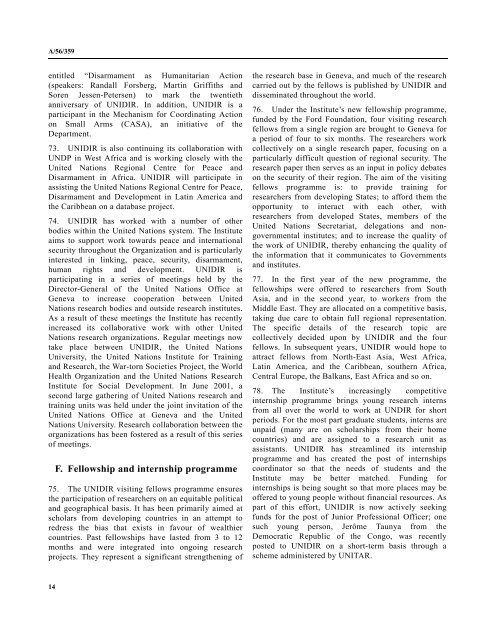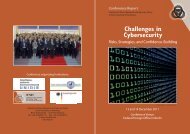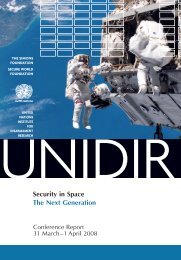General Assembly - UNIDIR
General Assembly - UNIDIR
General Assembly - UNIDIR
Create successful ePaper yourself
Turn your PDF publications into a flip-book with our unique Google optimized e-Paper software.
A/56/359<br />
entitled “Disarmament as Humanitarian Action<br />
(speakers: Randall Forsberg, Martin Griffiths and<br />
Soren Jessen-Petersen) to mark the twentieth<br />
anniversary of <strong>UNIDIR</strong>. In addition, <strong>UNIDIR</strong> is a<br />
participant in the Mechanism for Coordinating Action<br />
on Small Arms (CASA), an initiative of the<br />
Department.<br />
73. <strong>UNIDIR</strong> is also continuing its collaboration with<br />
UNDP in West Africa and is working closely with the<br />
United Nations Regional Centre for Peace and<br />
Disarmament in Africa. <strong>UNIDIR</strong> will participate in<br />
assisting the United Nations Regional Centre for Peace,<br />
Disarmament and Development in Latin America and<br />
the Caribbean on a database project.<br />
74. <strong>UNIDIR</strong> has worked with a number of other<br />
bodies within the United Nations system. The Institute<br />
aims to support work towards peace and international<br />
security throughout the Organization and is particularly<br />
interested in linking, peace, security, disarmament,<br />
human rights and development. <strong>UNIDIR</strong> is<br />
participating in a series of meetings held by the<br />
Director-<strong>General</strong> of the United Nations Office at<br />
Geneva to increase cooperation between United<br />
Nations research bodies and outside research institutes.<br />
As a result of these meetings the Institute has recently<br />
increased its collaborative work with other United<br />
Nations research organizations. Regular meetings now<br />
take place between <strong>UNIDIR</strong>, the United Nations<br />
University, the United Nations Institute for Training<br />
and Research, the War-torn Societies Project, the World<br />
Health Organization and the United Nations Research<br />
Institute for Social Development. In June 2001, a<br />
second large gathering of United Nations research and<br />
training units was held under the joint invitation of the<br />
United Nations Office at Geneva and the United<br />
Nations University. Research collaboration between the<br />
organizations has been fostered as a result of this series<br />
of meetings.<br />
F. Fellowship and internship programme<br />
75. The <strong>UNIDIR</strong> visiting fellows programme ensures<br />
the participation of researchers on an equitable political<br />
and geographical basis. It has been primarily aimed at<br />
scholars from developing countries in an attempt to<br />
redress the bias that exists in favour of wealthier<br />
countries. Past fellowships have lasted from 3 to 12<br />
months and were integrated into ongoing research<br />
projects. They represent a significant strengthening of<br />
the research base in Geneva, and much of the research<br />
carried out by the fellows is published by <strong>UNIDIR</strong> and<br />
disseminated throughout the world.<br />
76. Under the Institute’s new fellowship programme,<br />
funded by the Ford Foundation, four visiting research<br />
fellows from a single region are brought to Geneva for<br />
a period of four to six months. The researchers work<br />
collectively on a single research paper, focusing on a<br />
particularly difficult question of regional security. The<br />
research paper then serves as an input in policy debates<br />
on the security of their region. The aim of the visiting<br />
fellows programme is: to provide training for<br />
researchers from developing States; to afford them the<br />
opportunity to interact with each other, with<br />
researchers from developed States, members of the<br />
United Nations Secretariat, delegations and nongovernmental<br />
institutes; and to increase the quality of<br />
the work of <strong>UNIDIR</strong>, thereby enhancing the quality of<br />
the information that it communicates to Governments<br />
and institutes.<br />
77. In the first year of the new programme, the<br />
fellowships were offered to researchers from South<br />
Asia, and in the second year, to workers from the<br />
Middle East. They are allocated on a competitive basis,<br />
taking due care to obtain full regional representation.<br />
The specific details of the research topic are<br />
collectively decided upon by <strong>UNIDIR</strong> and the four<br />
fellows. In subsequent years, <strong>UNIDIR</strong> would hope to<br />
attract fellows from North-East Asia, West Africa,<br />
Latin America, and the Caribbean, southern Africa,<br />
Central Europe, the Balkans, East Africa and so on.<br />
78. The Institute’s increasingly competitive<br />
internship programme brings young research interns<br />
from all over the world to work at UNDIR for short<br />
periods. For the most part graduate students, interns are<br />
unpaid (many are on scholarships from their home<br />
countries) and are assigned to a research unit as<br />
assistants. <strong>UNIDIR</strong> has streamlined its internship<br />
programme and has created the post of internships<br />
coordinator so that the needs of students and the<br />
Institute may be better matched. Funding for<br />
internships is being sought so that more places may be<br />
offered to young people without financial resources. As<br />
part of this effort, <strong>UNIDIR</strong> is now actively seeking<br />
funds for the post of Junior Professional Officer; one<br />
such young person, Jerôme Taunya from the<br />
Democratic Republic of the Congo, was recently<br />
posted to <strong>UNIDIR</strong> on a short-term basis through a<br />
scheme administered by UNITAR.<br />
14








